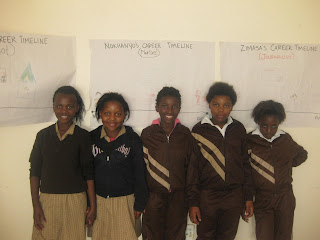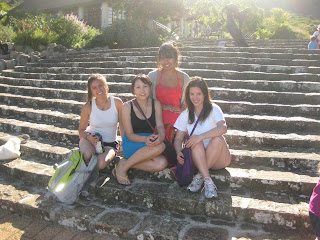Monday, November 15, 2010
Jane Eyre By Charlotte Bronte
Wednesday, June 2, 2010
Goodbye NKP

Today I said goodbye not only to the kids, but to the Nyanga experience. I suppose that’s the same with anything I do. But in the states there’s a sense of permanence. I can end an experience and begin a similar one right after. But when will I come back to South Africa? And if I ever return, will I go back to Nyanga?
I’m blessed to have had this opportunity. I’m blessed that these kids entered my life. They’ve taught me so much. I’ve been told, and I’ve feared, that I expect too much--that I’m naively optimistic. Because of these kids I’ve realized that it’s okay to have high expectations. It is okay to have hope.
The Nyanga kids will face various challenges in their lives. They’ll encounter cultural and structural barriers. But in this program they’ve demonstrated that they have the desire and motivation to succeed. I don’t know what will happen. Maybe they’ll all pass the matric? Maybe they’ll become successful community leaders?
Who knows. What this experience showed me is the power of teaching and the value of education. I have absolutely no doubt that if these 11 girls are given more attention in their formal school setting, they will succeed. It makes me sad that they might not receive that attention. It’s devastating that they might not realize they’re potential.
I have to keep marching ahead. Zimasa, Athi, Nokhanyo, Noduntando, Nontuthuzelo, Selina, Zandile, Nodumo, Wendy, Nasfa and Philasande, I wish you the best. Who knows, maybe someday we’ll meet again?
Sunday, May 30, 2010
Loosely related to my S.A. experience
http://news.bbc.co.uk/go/em/fr/-/2/hi/uk_news/wales/north_west/8452843.stm
There are obvious benefits to bilingualism and multilingualism. When will the United States get with the program?
Monday, May 24, 2010
Relationships

I’ve met some great people during this abroad experience. Now, three weeks away from departure, I can’t help but think about the goodbyes.
Relationships are transitory. That’s an easy enough statement. I’ve just never been in the position to understand the implications of the statement. And now, here I am, realizing that people who I met at the Stanford house, at UCT, in a bar or at the café, I may never see again. People weave in and out of my life. With many, I’ve had the ultimate say. I’ve decided who to let enter, or who to push out. It’s difficult when I have no control, when people, intentionally or unintentionally, decide to cut the bonds of our relationship. It’s even more difficult when neither one decides, when circumstances make the decisions.
It’s selfish or maybe immature to want to hold on to something—to preserve it because of how I’ve benefited. But that’s always been my nature. If I find someone or something of value, I keep it. I fight for it. As I emotionally prepare to leave, I’ve realized that I can’t use my old methods. I have to let go. At some point, I have to think “I had some good times with that person,” and leave it at that.
Perhaps this is a more optimistic way to think? It definitely seems healthier. To acknowledge the transitory nature of relationships is to realize their value in the present. At the moment we are hanging out because circumstances allow and we’re enjoying each other’s company. Maybe we won’t become best friends….but that doesn’t mean I can’t invest my person—my feelings, my thoughts and my energy. It’s a matter of living in the moment, I suppose.
Thursday, April 22, 2010
Privilege and Obligation
My definition of the term is a narrow one. In the past I’ve characterized privilege as an advantage that one doesn’t work for...an inherited advantage? Or a benefit that one encounters by chance? In honesty, I’ve always associated the term to wealth: “X is from a privileged background.” Meaning X was born into a wealthy family—something they had no control of—and now they have some sort of advantage because of that status. They are privileged.
This (perhaps shallow) use of the term makes it difficult for me to understand the supposed obligation that we have as privileged university students. I found a NY Times article, written in 1917 by the president of Oberlin College, titled “Higher Education as a Privileged Interest: The Obligation of the Privileged as Applied to the Moral Life of our Colleges and University.” In the last line Dr. King states: “Higher education, just because it is higher education and is thereby a highly privileged interest, owes to the community a great moral service.” This ‘privilege → obligation’ sentiment has surfaced at various points throughout my Stanford career.
I don’t see the connection between privilege and obligation. Don’t get me wrong, I think it’s great if privileged people help less privileged people. However, I don’t see it as a moral obligation. At first I thought that my inability to see the connection stemmed from my narrow definition of privilege. I couldn’t get past step 1...accepting that a higher education is a privilege. But now that I’ve broadened my scope of the term’s implications, I still fail to see the connection.
If you’re someone who has an advantage or a benefit...for whatever reason—inherited or earned, why should you feel obliged to give/help/support others? Privilege is such a nuanced concept. I guess I’m still not completely understanding its meaning??? I might be privileged to be at a prestigious university, but isn’t my male peer more privileged for being a Stanford student who also lives in a male-dominant world? Is he therefore more obliged to help?
Privilege is a nuanced term because of its subjectivity. It’s not logical to bestow obligation. I might agree that all of us, as human beings, have a moral obligation to help each other. But it's illogical to make a distinction or to say that because we’re in a position of privilege we have an obligation to do something.
That being said, for those participating in service learning, they shouldn’t feel that they HAVE to give back because of their privileged background. They should want to give back, despite their background.
Sunday, April 18, 2010
dance dance

I want to do a typical ‘recap of my day’ post. Yesterday was just too amazing of a day to forget.
Yesterday we went to Mzoli’s Meat, a butchery in the township of Gugulethu. The place is a meat-lovers paradise! Step number 1, choose your raw meat: beef, chicken, sausage, etc. Step 2, pay and take the plate over to have it cooked. Step 3, wait for about an hour, pick it up, and enjoy! Four of us shared some sausage, beef and pork. But what made it truly perfect was the beer. Meat and beer on a beautiful Saturday, what more could you ask for?
It’s hard to describe the location. Hopefully I can post some pictures soon. But imagine a club—the DJ, the music, the girls with fancy dresses, the dance moves, the alcohol. Next, imagine a cookout—the meat, the laughter, the sunshine, the relaxation. Now combine the two. That’s Mzoli’s.
My favorite part was the dancing. It was great to interact and dance with locals and other foreigners. It didn’t matter how ridiculous you danced, what race you were or what language you spoke. In those couple of hours, no one cared. Everyone (from 60 year old grannies to 10 year old kids) danced to the beats of the house/electronic/hip-hop music. Ooo, and thanks to Nathi I learned some dance moves to take back to the states. Hopefully he’ll be using the bachata moves that I showed him ☺.
For dinner Viria, Alex and I made “fried noodles.” I overcooked the noodles so it ended up being smooshed noodles instead….shmoodles. They were tasty, despite their smooshy texture. Afterward Ken played the guitar while the rest of us sang backstreet boys, Britney spears and outkast songs. Twas great.
Later that night we went to The Waiting Room, on Long Street. The club played amazingly good hip hop—Biggie, Common, Mos Def, J Dilla, Jay-Z. It was a chill place with foreigners and locals. Ended up having a good conversation with a UCT student. The topics? –the makings of a successful leader, the perceptions of foreigners, the history of hip hop in South Africa, and the fun of leaving humility behind.
Good day.
Thursday, April 15, 2010
Good Intentions?
South Africans are weary of foreigners. And foreigners, like myself, are EVERYWHERE. We’re in every township—willing to help, ready to engage. But the logical question is ‘why?’. Did I come to Cape Town with some opulent philanthropic objective? I’ve tried to be genuine with myself from the very beginning. I’m here to learn. I’m here to grow. But the only trace of altruism, I think, stems from a desire to someday use my South African-acquired knowledge to help people. But not even that is a guarantee.
I suppose I’m just as weary of myself—my actions and motives—as South Africans. I’m hopeful that through my service-learning, through what seems to be a selfish journey, I’ll help people along the way. But there are two problems with that logic. 1) there’s no assurance of that and more importantly 2) shouldn’t it be the other way around? Or shouldn’t my ONLY goal be to help?
The truth is that I don’t want to be naïve or pretentious. But I’m realizing that I’m letting this fear control me. I need to find that balance, a balance suggested by a quote in one of our readings: “Never be so heavenly minded that you’re no earthly good.” It’s a matter of being passionate and resolute about my good intentions as well as measured and realistic.
So all BS aside, what are my true intentions? I want to help—in the short and long term. I want to immerse myself in the Nyanga community and be of some assistance. Is this desire paternalistic? I don’t think so. It’s all in the approach. Service-learning involves two consensual agents. Nyanga has kindly opened its doors to me. Now it is my turn to become a knowledgeable and conscientious volunteer. Ideally, I’ll be able to contribute skills, perspectives and knowledge that I’ve acquired from previous experiences. In other words, I want to provide more than physical labor. I think I have more to offer. I know I have more to offer.
I want to learn. I want to learn about Nyanga, about my identity, about my interactions with others, about NGO’s, about South Africa…..I want to learn everything. And I want these experiences and knowledge to guide my academic, emotional and personal path. I want to put this knowledge to use—to make something out of this study abroad program.
Now I need to figure out what Nyanga and Shawco want. Hopefully there’s an overlap. If not, we’ll negotiate.